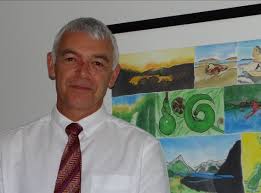Allenvale School Visitors
Allenvale School provides education in a specialist setting for students who have an intellectual disability. Many also have specific disabilities and/or difficulties. This means they require a highly differentiated teaching and learning pathway which is not available in a mainstream school.
We were privileged to welcome Gary Quarless, Principal, accompanied by Bev Wall, parent and PTA member, as our guests last week.

Gary opened his presentation with the phrase: “Every day starts with a sunrise and ends with a sunset.”
The start of a school day at Allenvale is very different to most mainstream schools. From 8:30am, a large number of mobility vans and taxis arriving from all over Christchurch. This can be quite the challenge as the school has one narrow access road and the front area is relatively small, especially with more than twenty vehicles coming and going!
In the future, a purpose built school will be built in Belfast but, as this is a 2 year design & build process, the school has to cope with their current setting and ‘make do’ in buildings and classrooms which were not originally designed for children who have special needs. “Having said that, the staff and board have done an amazing job in adapting many of the classroom and outside areas to make them as safe and accessible as possible. In this our PTA and local community have been incredibly supportive, especially Rotary.”
Everyone can learn and our goal is to maximise the opportunities for students to learn, achieve and progress throughout their schooling. As many students are non-verbal and do not read text, many different specialised communication technologies and ways of teaching are used at school.
Our most able senior students attend a community based facility near Northfields. Here, the primary focus is to maximise their involvement in and access to their local community and their independence as they are after all young adults.
“For example, developing the students’ social and monetary skills enable them use local buses, travel to and use shops or just enjoy a drink in a café with friends.” explained Gary.
With respect to the various causes of the challenges the school’s students face, Gary identified the three main origins as:
- Global developmental delay – this means there are significant intellectual delays in all areas with students from birth.
- Disease and infection, either pre or post-birth resulting in intellectual disability.
- Injury or accidents.
In the past, many children who had significant physical disabilities or health issues did not live into adulthood but, as medical interventions have improved and developed, many are now living well into adulthood. “This brings more complex, multi-layered students into our school and requires health professionals to increasingly be part of the team” noted Gary.
The school curriculum is based on the NZC (New Zealand Curriculum document) and increasingly focuses on the five key ‘Key Competencies’ for learning:
- Thinking.
- Using language, symbols and text
- Managing self.
- Relating to others.
- Participating and contributing.
Two key competencies that the school aims to prioritise are Relating to Others and Managing Self. Tertiary sectors and business have both identified these as essential skill areas they often find lacking in young adults and the MOE is currently looking at the implications of this for all our schools and curriculum.
“Over the last few decades, increasing numbers of children are going to school while not being ‘ready to learn.’ Here in Canterbury, many schools have adopted Play Based Learning approaches to address this. At school we are exploring how we can incorporate this into our own practice” shared Gary.
Developing a Rich Communication environment is a foundation block at Allenvale, as is student voice. The latter has been well captured in the consultations regarding the design of our new school, both within our school and the wider community.
It is also important to recognise and celebrate students as positive members of our local community and indeed wider society. One way we do this is to hold termly Mufti-Days to support national events, such as Loud Shirt Day or Autism Awareness Day. Donations collected on these day are all sent to the chosen charity, and our students and whānau really do enjoy being able to ‘give back.’
“This days can be great fun too” noted Gary with one example being the holding of their own Highland Games event recently.
“At the end of each day, we return to what can often look like ‘controlled chaos’ as we support 146 students to access their vehicles for the journey homes” smiled Gary.
In conclusion, Gary noted that one of their biggest issues is obtaining appropriate funding as the school is very reliant on raising additional each year to the standard MoE grants in order to help address the learning, health and family challenges of all students.
We then asked Bev for her thoughts as a parent of a child at the school.
.jpg)
“You often don’t know what is going to happen to your child going forward and I would like to ensure he has support and that I can trust the staff to look after him” she replied.
“I love picking Caleb up when he is smiling and happy as that way I know he is also safe.”
.jpg)
Lois thanked Gary and Bev for their insights into Allenvale, the challenges they face, and the great work they are doing in ensuring their students receive the very best education possible going forward.